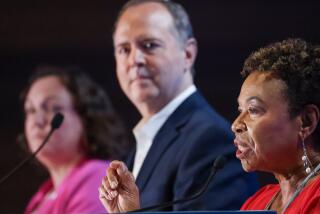Zschau ‘Credibility’ on Terrorist Issue Questioned by Foes
- Share via
First it was Democratic Sen. Alan Cranston who was accused of being soft on terrorists. The senator called that charge preposterous and offered a list of votes he has cast to prove his case.
Now, the same charge has been leveled against his Republican opponent, Rep. Ed Zschau. And Zschau has responded with a painstaking explanation of how far off base he believes the accusation is.
The negative attacks in California’s U.S. Senate race show no signs of abating. Instead of debates between the candidates, an idea that Cranston has rejected, there are daily salvos from the campaign bunkers.
Cranston, stung a month ago by Zschau television ads that claimed the senator had “voted against or missed virtually every tough law on terrorism,” lashed back Wednesday by introducing a Zschau House colleague who said that Zschau had supported legislation that would have prevented the President from halting exports to countries committing terrorism.
When Congress was revising the Export Administration Act in 1983, said Rep. Howard Berman (D-Los Angeles) in a Los Angeles press conference, Zschau supported a provision that would have “rescinded the President’s authority to halt exports . . . even in a case where he knew the equipment could be used to further terrorism.”
Zschau took the position that the President did not need that authority because he had it under another law and that the change in the export act was needed to reassure foreign customers that their contracts with U.S. firms would be honored.
But Berman offered an amendment to give the President the power to halt exports in cases where terrorism and human rights violations are involved.
Opposition Cited
“Ed Zschau fought my amendment in the Foreign Affairs Committee and later voted . . . on the House floor to restore the original contract sanctity language,” Berman said.
“I am not here to imply that Ed Zschau supports terrorists,” Berman continued, “because I do not think he does. But his commitment to a business’ right to ship equipment even if the equipment could go to terrorists means he does not have the credibility to accuse Alan Cranston of being soft on terrorism.”
Cranston, who stood beside Berman at the press conference, then ripped into Zschau:
“Ed Zschau was trying to deprive President Reagan of a tool to use against terrorists, while I was on the side of the President,” Cranston said, explaining that he and Berman joined a Reagan Administration effort to keep Congress from rescinding the President’s right to halt exports under the Export Administration Act.
Berman noted that he, Cranston and others won the battle and the President continues to have that right under the export act.
Zschau Viewpoint
But he does not need it, according to Zschau spokesman Jim LeMunyon, who countered Berman’s charges Wednesday by explaining that Berman had failed to mention a more important tool the President has to halt exports to terrorists.
“The International Economic Powers Act already provides broad authority to terminate contracts. What Ed and others were trying to do with the export act was reassure our customers abroad that their contracts would not just be cut off all of a sudden through some provision in the export act.
“At the subcommittee hearings we heard many stories from U.S. companies who said they lost business to foreign competitors because (under the Export Administration Act) there was no certainty the contracts could be met.
“Ed Zschau wanted a strong statement that as a matter of policy the United States supports the sanctity of contracts.”
Dispute on Computers
Berman also charged Wednesday that when the House passed South African sanctions in 1985, “Ed Zschau came to my office and asked if I would weaken my amendment to ban all computer sales to the South African government. He did not want the ban to cover government agencies that were not using the computers to administer apartheid. I could not go along with that because there is no way to know what they will use the computers for once they get them.”
Zschau aide LeMunyon responded to Berman’s charge by saying, “I was not at that meeting between Ed and Howard, but I can tell you that Ed Zschau opposes selling computers to South African agencies that administer apartheid.”
More to Read
Get the L.A. Times Politics newsletter
Deeply reported insights into legislation, politics and policy from Sacramento, Washington and beyond. In your inbox twice per week.
You may occasionally receive promotional content from the Los Angeles Times.








